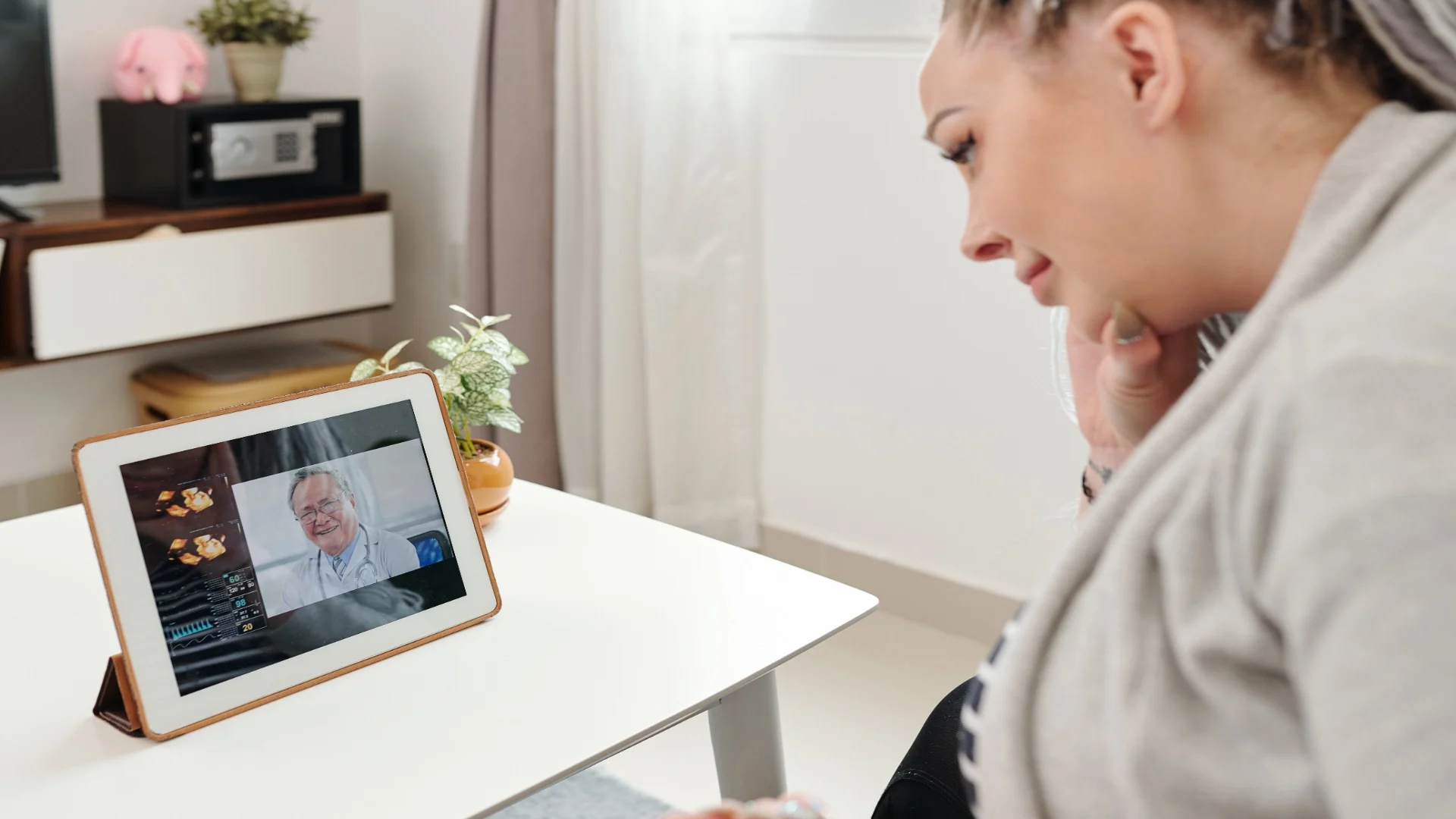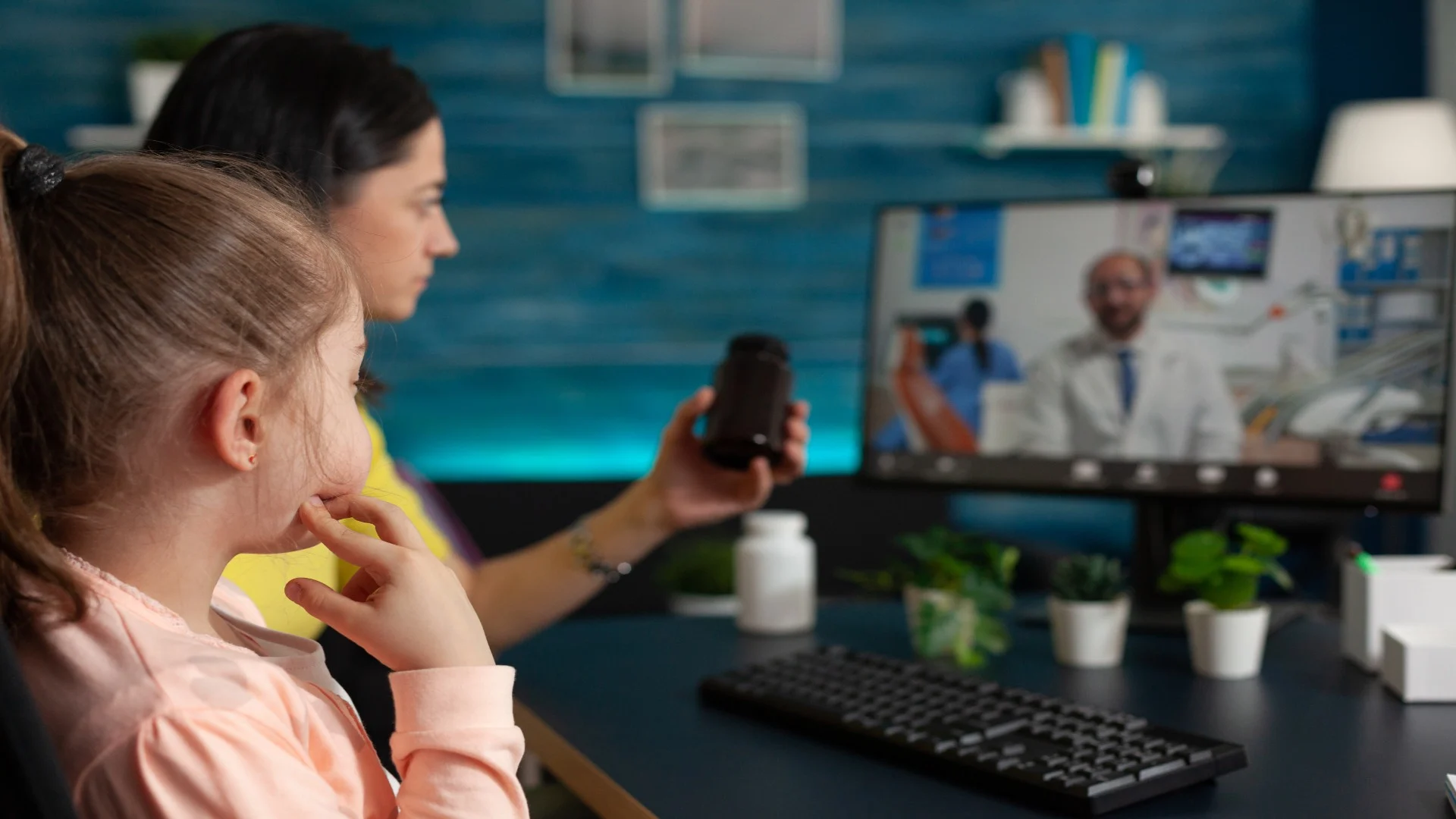Mental Health
Telehealth Behavioral Health

Discover how telehealth behavioral health provides accessible, personalized care for mental health and addiction recovery— anywhere, with expert support.
What is telehealth behavioral health care?
Telehealth behavioral healthcare utilizes secure digital tools, such as video conferencing, apps, and phone calls, to deliver therapy and addiction support remotely. It allows real-time interaction with licensed professionals, offering convenience and flexibility without compromising the quality of care.
How does telehealth improve access to services?
Telehealth improves access by eliminating the need for travel and reducing wait times. People in rural or underserved areas can receive timely mental health or addiction treatment from home, making consistent care more attainable and reducing obstacles like transportation and time constraints.
How is my privacy protected in telehealth sessions?
Telehealth providers utilize secure, encrypted platforms that comply with privacy laws, such as HIPAA. These systems ensure patient data is protected during communication and storage. Additionally, identity verification and regular audits help maintain confidentiality and build trust between the patient and the provider.
Can telehealth services be tailored to meet my needs?
Telehealth services are easily tailored to fit your unique needs. Treatment plans are tailored to individual assessments and may include therapy, medication management, or support groups—all scheduled to fit your life for maximum convenience and effectiveness in your recovery journey.
Is telehealth effective for addiction recovery?
Yes, telehealth is highly effective for addiction recovery. It offers personalized care, regular check-ins, and privacy, which are vital for long-term success. Studies show that remote treatment enhances engagement, reduces the risk of relapse, and supports sustained recovery through ongoing virtual guidance.
Telehealth is revolutionizing behavioral health by offering accessible, personalized care for mental health and addiction recovery. It overcomes geographical, financial, and social barriers, delivering professional support straight to your home. At The Edge Treatment Center, we utilize telehealth to provide personalized treatment that aligns with your specific needs and lifestyle.
Whether you’re battling depression, anxiety, or substance use disorder, our virtual care connects you with compassionate experts and evidence-based solutions. This article examines how Telehealth behavioral health is transforming recovery journeys, enabling enhanced privacy, reduced costs, and continuous support for long-lasting healing and an improved quality of life.
The Rise of Telehealth Behavioral Health
Telehealth has rapidly gained ground in behavioral health due to its flexibility and reach. It makes services available to individuals regardless of their location or mobility. Telehealth also helps reduce stigma, allowing people to seek help in private, familiar settings.
Key Benefits
Increased Access: Connects underserved populations with essential care.
Personalized Treatment: Care plans are tailored to each individual's needs.
Convenience and Flexibility: Enables streamlined scheduling and reduced travel.
Addressing Challenges: Despite its growth, telehealth faces several challenges, including limited access to technology and concerns about privacy. These issues can be addressed through infrastructure improvements and the use of secure, compliant platforms.
Technological Innovation: Emerging technologies, such as AI-driven diagnostics and interactive therapy tools, are continually enhancing the quality and effectiveness of virtual care. The future of telehealth lies in the seamless integration of tech to support more responsive and comprehensive behavioral health services.
Benefits of Telehealth for Mental Health Care
Expanding Reach: Telehealth eliminates the physical limitations of traditional therapy by making services available to those in remote or rural locations. It ensures that mental health support is just a click away.
Flexible Scheduling: Telehealth offers adaptable appointment times, enabling individuals to easily fit sessions into their daily routines. This flexibility promotes consistent care without disrupting work, family, or other obligations.
Enhanced Privacy: Virtual sessions protect individuals from the stigma often associated with seeking therapy. They can receive treatment discreetly, which increases comfort and openness during sessions.
Cost-Effective Care: By eliminating expenses such as transportation and office overhead, telehealth often reduces the overall cost of mental health care, making it more accessible and sustainable for a broader population.
Ongoing Monitoring and Support: Regular check-ins through telehealth platforms enable continuous monitoring and timely adjustments to treatment plans, improving outcomes and engagement.

We’re Here To Help You Find Your Way
Would you like more information about telehealth? Reach out today.
Telehealth in Addiction Recovery

Telehealth is reshaping addiction recovery by making treatment more accessible, private, and adaptable to individual needs.
Wider Access to
Telehealth eliminates the need for individuals battling substance use disorders to travel long distances to receive treatment. This accessibility is particularly crucial for those living in areas with limited or no addiction recovery services.
It ensures that, regardless of where someone resides, they can access therapy, support groups, medication management, and educational resources immediately. This broad reach helps close the treatment gap for many underserved communities.
Confidential Care Environment
Maintaining confidentiality is a cornerstone of successful addiction recovery. Telehealth provides a secure and private space where individuals can engage openly with licensed professionals without fear of judgment or exposure.
This sense of safety fosters greater honesty and trust, which are essential for therapeutic progress. Clients can attend sessions from their own private spaces, eliminating anxiety that might come from in-person visits.
Tailored Treatment Options

Telehealth enables providers to adapt treatment plans in real-time based on the patient’s current needs, behavior, or feedback. Clinicians can adjust therapy techniques, medication dosages, or introduce new coping strategies during sessions to optimize patient care and treatment outcomes.
This dynamic and responsive model enables more effective care, particularly in moments of crisis or rapid change. Personalized treatment, delivered virtually, ensures that recovery strategies evolve in tandem with the patient’s progress, supporting long-term sobriety and mental wellness.
Personalized Treatment Plans: Centering the Individual
Personalized care is at the heart of successful behavioral health treatment. By tailoring support to individual experiences, telehealth ensures that each person’s path to recovery is uniquely compelling and empowering.
Individualized Focus
Effective recovery begins with personalized care. By considering an individual's medical history, lifestyle, cultural background, preferences, and specific challenges, treatment becomes more relevant, engaging, and impactful. This approach ensures that patients feel seen, heard, and supported throughout their recovery journey.
Comprehensive Assessments
The process begins with comprehensive evaluations, including clinical interviews, psychological screenings, and reviews of health histories. These assessments help clinicians uncover underlying mental health conditions, emotional stressors, and environmental triggers. The insights gathered guide the selection of evidence-based therapies, medication plans, and holistic interventions.
Dynamic and Responsive Care
As patients evolve through their treatment, telehealth allows providers to adjust care plans in real-time. Whether a patient experiences a setback, reaches a milestone, or expresses a change in their recovery goals, clinicians can fine-tune their approach accordingly. This responsiveness enhances therapeutic outcomes, supports long-term engagement, and ensures the care plan remains aligned with the patient’s progress and well-being.
Ensuring Accessibility and Convenience
Bridging the Distance: Telehealth brings behavioral healthcare to anyone with an internet connection, breaking down logistical barriers and ensuring that help is always within reach.
Seamless Scheduling: Sessions can be arranged to suit any lifestyle, reducing wait times and avoiding the stress of long commutes or time off work.
Technical Readiness: A stable internet connection, a secure device, and knowledge of the platform are all that's required to access care. Providers often help patients set up and use telehealth platforms smoothly.

We’ll Lead You to New Heights
Do you have more questions about telehealth? Reach out.
Addressing Privacy and Security Concerns
Privacy and data security are foundational to the success of telehealth in behavioral health care. Ensuring that patients feel safe and protected during virtual interactions is crucial for establishing trust and fostering open, honest communication.
Regulatory Compliance
Telehealth platforms comply with healthcare privacy laws, such as HIPAA, which are designed to protect patient data.
These regulations impose stringent standards for data handling, including the storage, transmission, and access of information. Providers must be trained to understand and uphold these legal obligations, ensuring that confidentiality is maintained across all virtual interactions.
Secure Infrastructure
Security measures embedded in telehealth tools include advanced encryption, multi-factor authentication, and firewall protection.
These technologies help safeguard patient data from cyber threats and unauthorized access. Additionally, platforms undergo routine security assessments and software updates to address emerging vulnerabilities and enhance system resilience.
Patient Education
Patients are educated on best practices for protecting their digital privacy. This includes using secure internet connections, logging into telehealth sessions from private locations, and understanding how their data is being used.
Empowering patients with this knowledge builds trust in the platform and encourages active participation in maintaining their privacy and security.
Embracing Technology for Better Outcomes
Real-time monitoring of digital applications can track mood changes, medication adherence, and symptom progression. This allows clinicians to make informed decisions quickly.
Consistent Engagement Through Video therapy ensures continuity of care, reinforces therapeutic relationships, and supports patient accountability. This regular interaction can reduce the risk of relapse and support long-term recovery.
Technology as a Recovery Tool. From appointment reminders to self-guided CBT modules, technology enhances treatment by supporting patients between sessions and encouraging self-management.
Empowered Steps Toward A Healthier Tomorrow
Telehealth has revolutionized behavioral health, providing reliable, private, and personalized care to individuals seeking recovery. At The Edge Treatment Center, we’re committed to helping you reclaim your life with virtual support designed for your unique challenges. Our professionals guide you with compassion and clinical expertise, whether you’re overcoming trauma, depression, or substance use.
With Telehealth behavioral health, healing fits seamlessly into your everyday life. Let’s take the next step together. Partner with us and embrace a future full of clarity, purpose, and peace—because you deserve to recover on your terms, from anywhere, at any time.

We’re Here To Help You Find Your Way
If you or a loved one is struggling with addiction, there is hope. Our team can guide you on your journey to recovery. Call us today.
Written by
The Edge Treatment Center
Reviewed by
 Jeremy Arzt
Jeremy ArztChief Clinical Officer
Mental Health
July 16, 2025
